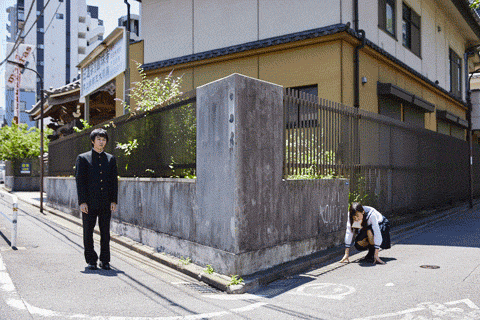One thing I love is language, and making the decision to study Japanese in university back at SDSU was one of the best choices I could have made. It put me on the path that would lead me to Japan, my home for nearly 30 years, and made it possible for me to create J-List, JAST USA, and J18 Publishing. But during my study of the language, I learned some interesting things, including how concepts from one language don’t cleanly translate to another one. Here’s a post exploring six surprising things I learned by studying Japanese!

Six Strange Things I Encountered by Studying Japanese
The first shock anyone studying Japanese experiences is when you buckle down to teach your brain hiragana, the first phonetic writing system, which looks like little worms and meaningless scratches at first… then after a week or two, you realize your brain can be trained to read a non-Roman script quite easily. Before long your brain is reading without your conscious awareness, which is quite an exciting discovery to make. (J-List has hiragana and katakana flashcards as well as textbooks in stock to help get you started!)
Did you know that learning Japanese is actually easy? See this post on how I learned Japanese here!

One of the first strange patches you learn is that concepts your brain has internalized ever since you were a baby need to be split into two, which literally requires chemical changes in your brain as synapses are forced to rewire themselves. The first example is how the concept of “cold” comes in two different flavors in Japanese: Samui or coldness in the air and tsumetai or coldness to the touch. Learning which word to use sounds simple, but it’s pretty much a given that we’ll use the wrong term 100% of the time, leading to confusion and amusement.

Next is the very basic concept of how to express being in a place. In Japanese, things that are inanimate and not alive get the verb aru/arimasu while anything living uses the verb iru/imasu. So if your car is in front of your house, you’d use arimasu for it, but any person, dog, or a flying insect would take imasu. This naturally leads us to bug our teacher asking which verb we’d use for a Venus Fly Trap, a freshly-killed corpse, or a Gundam, because part of learning a language involves testing its limits. (The answer for these is aru for all, except a Gundam that’s in motion with a human pilot inside, which would be iru.)
When I first got to Japan, I stayed with a family that had a young child. I observed the child make a mistake, saying kuruma ga iru for “there’s a car here,” because the car was moving and thus the same as a dog or human who were moving. This was a reminder that in terms of Japanese I was on exactly the same level as that child, likely to make the same linguistic mistakes for the same reasons. Which I thought was kind of cool. Want to be a child again? Just start studying a foreign language!
(Subjectively, learning these verbs is similar to how new students of Spanish have to work out that ser describes permanent states, like me being an American from California, while estar is for more temporary states like where I physically am located today, or my current mood.)

Studying Japanese? Prepare To Learn some French and German, Too
Modern English has a complex history of invasions by different linguistic groups into the British Isles, all of which have shaped the language we speak today. When we go to speak or write something, we usually have three “levels” of vocabulary to choose from depending on the tone we want to strike. You can ask a person for information using the Old English word, question them about something with a French-imported word, or interrogate them, using a Latin-originated term.
This all works the same in modern Japanese, but the three “levels” of complexity are original Japanese words which are simpler and more down-to-earth, Chinese-imported words that make up the backbone of Japanese vocabulary, and English words, which educated Japanese will sprinkle into their speech to make themselves sound sophisticated.

A small problem comes when the Japanese important “English” words from French, Dutch or German and use them in English, not understanding why foreigners’ eyes glaze over at random times. Some examples:
- アルバイト arubaito, a part-time job, from the German arbeit
- アンケート ankeeto, a questionnaire, from the French enquête
- バカンス bakansu, a vacation, from French vacances
- ピエロ piero, a clown, from French pierrot (partially done to avoid confusion with the English word “crown”)
- ランドセル randoseru, a child’s school backpack, from the Dutch ransel
Also, any foreign word related to medicine will generally be from German, which is why an X-ray machine is called a レントゲン rentogen in Japanese, from the German word röntgen, a measure of radiation exposure.
Some Words Get “Mapped” Differently in Japanese
If you watch dubbed anime with subtitles, sometimes you’ll hear characters use the English word tension, but the translation will be something like “excitement” or “fun times with your friends.” It’s one example of how a word’s meaning can shift when it gets imported into another language, the way bitch basically means slut in Japanese.

Another word is “proposal” which the Japanese use in English only in the context of a wedding proposal. To make a business proposal to your boss you’d use the word 提案 teian. I find the idea that somewhere a Japanese woman has had a foreign co-worker say “I’ve got a proposal for you” in a business context but got confused that he was about to propose marriage to her to be absolutely adorable. Maybe they should make an anime about that.

One of the first words we learn when reading romantic comedy manga is kokuhaku, when a character confesses their feeling to another character. But a simple concept like “confess” can be surprisingly complex, and there are three terms in Japanese:
- 告白 kokuhaku, a confession of love
- 自首 jishu, to confess to a crime, such as a murder
- 懺悔 zange, confession of past sin, as in Catholic confession
It would be just like us gaijin to work up the nerve to confess to a pretty girl, then accidentally tell her we want to confess to a murder instead.
Sarcasm Doesn’t Work in Japanese
It’s natural that not every level of humor translates well to other languages. Top Gear was quite popular in Japan, and when old episodes are showing on TV I’d watch them with Mrs. J-List following along with the Japanese subtitles. Japanese don’t understand the concept of “British understatement” and my wife would look confused at my laughter when Jeremy Clarkson would say “the supports on this car are so low you can feel every amoeba you drive over,” or “the headroom of this convertible is only a few inches, but if you put the top down it expands to several thousand miles.”
The concept of sarcasm is another concept that doesn’t translate well to Japanese, and I’m used to making a sarcastic statement and having my family stop me to ask if I’m saying the opposite of what I mean, like I always do. Linguistically the concepts of sarcasm, irony, cynicism, and hyperbole are all extremely hard to express in Japanese.

Love is another concept that can be difficult to pin down. There are two words for love in Japanese: 恋 koi which describes the hot passionate love that comes earlier in a relationship, and 愛 ai, which covers the deeper, longer-lasting love over many years, or love of family. (The two words are often combined into 恋愛 ren’ai, which covers all aspects of romantic and deeper love.) Often we’ll be watching foreign dramas about characters in rough relationships, and Mrs. J-List will say something like, “Don’t foreigners realize that koi and ai are different kinds of love, and both are important to a relationship?”

More Japanese Terms: Bike or Motorcycle?
In most languages, the word bike can refer to a motorcycle or a bicycle, but in Japan, it always refers to motorized two-wheel transportation, which causes an odd discomfort inside my brain sometimes, and I might find myself avoiding referring to my bicycle as a bike while back home in the U.S.
Thanks for reading this post about some surprising things I learned while studying Japanese. Got any questions about the language, or how to study it? Post them below, or hit me up on Twitter!
The awesome staff of J18 Publishing is killing it again this week, with two new hentai artbooks that are 100% uncensored and fully translated into English. Enjoy both artbooks by illustrator Mikoyan which explore the futanari genre in ways that will delight and amaze you. Preorder both books here!
















